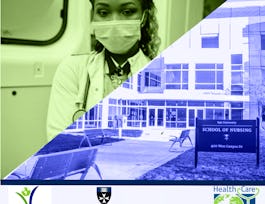This third of five courses explores topics related to the social determinants of health and health care systems. This course will also focus on the relationship between the social determinants of health, mental health, substance abuse, and trauma. The topics of this course include:



Social Determinants of Health: Health Care Systems
Dieser Kurs ist Teil von Spezialisierung Social Determinants of Health: Data to Action


Dozenten: Daniel J. Pesut, Ph.D., RN, FAAN
Bei  enthalten
enthalten
Kompetenzen, die Sie erwerben
- Kategorie: Health Informatics
- Kategorie: Data Analysis
- Kategorie: Health Equity
- Kategorie: Data Visualization
- Kategorie: health system
Wichtige Details

Zu Ihrem LinkedIn-Profil hinzufügen
8 Aufgaben
Erfahren Sie, wie Mitarbeiter führender Unternehmen gefragte Kompetenzen erwerben.

Erweitern Sie Ihre Fachkenntnisse
- Lernen Sie neue Konzepte von Branchenexperten
- Gewinnen Sie ein Grundverständnis bestimmter Themen oder Tools
- Erwerben Sie berufsrelevante Kompetenzen durch praktische Projekte
- Erwerben Sie ein Berufszertifikat zur Vorlage


Erwerben Sie ein Karrierezertifikat.
Fügen Sie diese Qualifikation zur Ihrem LinkedIn-Profil oder Ihrem Lebenslauf hinzu.
Teilen Sie es in den sozialen Medien und in Ihrer Leistungsbeurteilung.

In diesem Kurs gibt es 5 Module
This module will introduce the concept of health literacy, as we also examine how health literacy is measured. In lesson one, we will look at some of the social determinants of health that interact with health literacy, as we investigate the link between low health literacy and poor health outcomes. We will also review the Health Literacy Umbrella as a framework for improving health literacy, as we evaluate several policies, solutions, and perspectives for addressing disparities in health literacy. In lesson two, we will explore some of the resources available for measuring health literacy as we consider the many perspectives of health literacy measurement.
Das ist alles enthalten
3 Videos5 Lektüren2 Aufgaben1 Diskussionsthema5 Plug-ins
In this module, we will examine the impact of the social determinants of health on mental health and substance abuse. In lesson one, we will define mental health, as we look at the global prevalence and global burden of mental health disorders. This lesson will also focus on the global prevalence and global burden of substance abuse disorders, as we investigate influencing factors of drug use. Lesson two will introduce the life course approach to mental health, as we discuss both risk factors and protective factors that impact mental health. We will also consider how the social determinants of health contribute to mental health outcomes. Finally in lesson three, we will evaluate global, national, and regional policies and interventions for improving mental health outcomes.
Das ist alles enthalten
4 Videos10 Lektüren2 Aufgaben1 Diskussionsthema3 Plug-ins
In this module, we will look at the relationship between violence, conflict and trauma and the social determinants of health. In lesson one, we will define the different types of trauma, as we look at the global prevalence of violent and traumatic events. We will also focus on the effects of trauma and violence in vulnerable populations. Lesson two will explore Adverse Childhood Experiences in the context of social determinants of health. The impact of trauma on vulnerable countries and communities will also be examined. In lesson three, we will evaluate community resources, policies and interventions for addressing violence, conflict, and trauma in communities. We will also look at examples of effective interventions as we consider how to improve the social determinants of health and reduce trauma experiences.
Das ist alles enthalten
3 Videos9 Lektüren2 Aufgaben1 Diskussionsthema1 Plug-in
This module will focus on the ethical considerations of addressing social determinants of health in health systems, and the ethical considerations of using SDOH-related data. In lesson one, we will explore the “Spheres of Influence'' framework in order to understand the ethical principles that guide how clinicians, health care organizations and communities should address SDOH. We will also examine the Public Health Code of Ethics, as we review the concept of health justice and health equity. In lesson two, we will evaluate the ethical considerations related to the use of SDOH data. We will also explore the five guiding principles proposed by the Executives for Health Innovation as part of the ethical framework for SDOH data. Finally, we will assess how the ethical frameworks discussed in this course can be applied to our course data sets, as we consider how our findings might be employed in a health system or to guide action to improve health.
Das ist alles enthalten
2 Videos4 Lektüren2 Aufgaben1 Diskussionsthema4 Plug-ins
This module will focus on analyzing, displaying and interpreting social determinants of health data, with a particular focus on identifying correlations between social determinants of health. Lesson one will provide an overview of correlation analysis and heat map visualization. In lesson two, we will learn how to calculate the Pearson correlation coefficient and create heatmaps in R. Using the NHANES dataset, we will look at the correlation between income, education, marital status, family savings, depression, insurance, household size, drinks per day, smoker, and body mass index. Using the Omaha System dataset, we will look at the correlation between the social determinants of health signs & symptoms. Finally, we will discuss how to interpret the results of our analysis as we visualize our findings using heatmaps.
Das ist alles enthalten
2 Videos4 Lektüren1 peer review1 Diskussionsthema1 Unbewertetes Labor4 Plug-ins
Dozenten


Empfohlen, wenn Sie sich für Health Informatics interessieren

Yale University

University of Michigan

Johns Hopkins University

Universiteit Leiden
Warum entscheiden sich Menschen für Coursera für ihre Karriere?





Neue Karrieremöglichkeiten mit Coursera Plus
Unbegrenzter Zugang zu 10,000+ Weltklasse-Kursen, praktischen Projekten und berufsqualifizierenden Zertifikatsprogrammen - alles in Ihrem Abonnement enthalten
Bringen Sie Ihre Karriere mit einem Online-Abschluss voran.
Erwerben Sie einen Abschluss von erstklassigen Universitäten – 100 % online
Schließen Sie sich mehr als 3.400 Unternehmen in aller Welt an, die sich für Coursera for Business entschieden haben.
Schulen Sie Ihre Mitarbeiter*innen, um sich in der digitalen Wirtschaft zu behaupten.
Häufig gestellte Fragen
Access to lectures and assignments depends on your type of enrollment. If you take a course in audit mode, you will be able to see most course materials for free. To access graded assignments and to earn a Certificate, you will need to purchase the Certificate experience, during or after your audit. If you don't see the audit option:
The course may not offer an audit option. You can try a Free Trial instead, or apply for Financial Aid.
The course may offer 'Full Course, No Certificate' instead. This option lets you see all course materials, submit required assessments, and get a final grade. This also means that you will not be able to purchase a Certificate experience.
When you enroll in the course, you get access to all of the courses in the Specialization, and you earn a certificate when you complete the work. Your electronic Certificate will be added to your Accomplishments page - from there, you can print your Certificate or add it to your LinkedIn profile. If you only want to read and view the course content, you can audit the course for free.
If you subscribed, you get a 7-day free trial during which you can cancel at no penalty. After that, we don’t give refunds, but you can cancel your subscription at any time. See our full refund policy.

